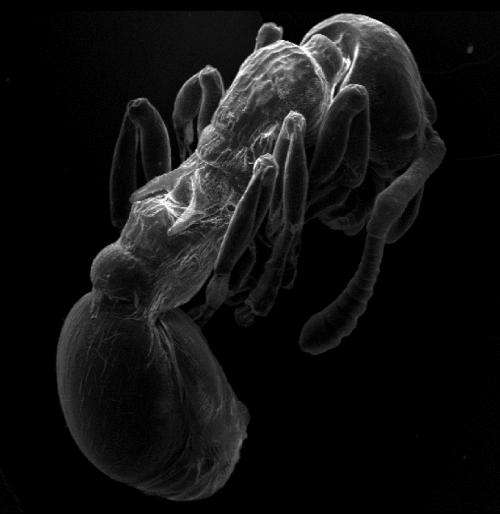For ant pupae, status means being heard

caught between larva and adulthood—status is all about being heard. The findings, reported online on February 7 in Current Biology, a Cell Press publication, add to evidence that ants can communicate abstract information through sound in addition to chemical cues.
"One of the truly fascinating characteristics of social insects is their power of self-organization, which allows their societies to achieve amazing feats way beyond the ability of individuals, and communication is key to these achievements," said Karsten Schönrogge of the Centre for Ecology & Hydrology (CEH) in the United Kingdom. "Our experiments are the first to show not only that ant pupae use sound to communicate with the adults in their colony, but also that the social ranking of mature pupae depends on their ability to make those sounds."
Social insects were known to use chemical pheromones to recognize each other and to organize complex behaviors such as swarming. Researchers also knew that ants make audible sounds. But it wasn't so clear until recently that those sounds might actually mean something.
The new work, by scientists at CEH, University of Oxford, and University of Turin, shows that as soon as the ants' bodies begin to harden as pupae, they begin making sounds similar to adults with their "file and scraper" organs, although the sounds are first emitted as single pulses, not longer sequences.
It turns out that those sounds are essential for pupae to maintain their rightful place in the ant hierarchy, above their younger, larval siblings. When unstressed adult worker ants hear those sounds from pupae, they are assigned priority over their silent fellows in rescue operations back to the nest. Pupae experimentally rendered mute lose that higher-priority status.
The findings suggest that acoustics might actually replace chemicals as a mode of communication in this phase of an ant's social life, the researchers say. They also confirm that ants are able to send and receive signals across multiple information "channels."
"It seems highly likely that, in some situations, one type of signal might mediate the response to another," Schönrogge said. "The implications of this additional layer of flexibility need to be explored."
More information: Current Biology, Casacci et al.: "Ant Pupae Employ Acoustics to communicate Social Status in their Colony's Hierarchy." dx.doi.org/10.1016/j.cub.2013.01.010
Journal information: Current Biology
Provided by Cell Press


















